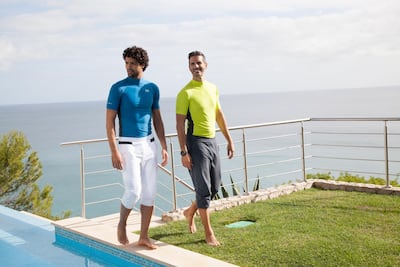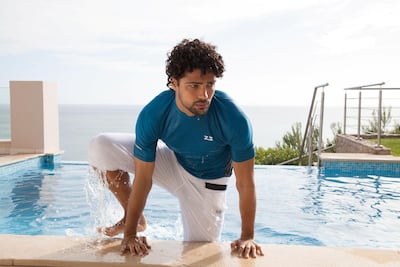Modest fashion is booming – the State of the Global Islamic Economy Report 2019-20 projects that Muslim spending on fashion will reach $402 billion (Dh1.4 trillion) by 2024. But while conservative cuts have been trending in retail, a major criticism of the movement is that it centres on clothing for women, and overlooks the possible modesty requirements of male consumers.
Beyond the burkini
When one hears the phrase modest swimwear, for instance, the mind usually conjures up images of burkinis. They are worn primarily by Muslim women who want to go swimming while adhering to their conservative dress codes.
Muslim men, meanwhile, often strut around topless and in shorts, or perhaps fitted swimming trunks. Those who wish for more coverage opt for a topsy-turvy combination of larger-sized shorts and T-shirts, which look neither sleek nor stylish.

But a husband-and-wife duo in the UK, Amir and Yasmin Latifi, are adding a new dimension to the modest fashion sector with their brand Zusaura – a swimwear label for men that launched in London last month and combines faith with functionality and style.
Amir, a British-Pakistani who was raised in Abu Dhabi, has a background in the oilfield services sector, while his wife, Yasmin, is a doctor. "The idea for Zusaura took seed when we were on holiday in Dubai in 2012 and could not find swimwear for myself that met our faith and taste needs," he tells The National.
'A shared problem'
“This, judging from the attire of other male swimmers on that holiday, seemed to be a shared problem – there were lots of men wearing ad-hoc ensembles of T-shirts with oversized and ill-fitting boardshorts, while at the pool or beach. Paris Fashion Week it most definitely was not.”
The two set out to design below-the-knee boardshorts and colourful rash vests using Portuguese and Italian-made swimwear fabrics.
Amir says it was essential that the label's designs complied with modesty guidelines for Muslim men. He explains that in order to embody "haya", the Islamic principle of modesty, both men and women have certain codes of coverage to adhere to.
"In terms of dress, this manifests as a requirement for Muslim men to cover their 'awrah', or intimate parts of the body. The awrah for men is defined as the area from navel to the knee," he says.
Nuriddeen Knight, an author in New York and a Yakeen Institute fellow who often speaks about feminism and gender roles in Islam, says the traditional implementations of modesty, as seen from the example of the Prophet and early Muslims, surpass the textual requirements, and that men need not comply with just the bare minimum (covering naval to knee). “Men as well as women should consider that modesty is and always has been a valuable part of their faith,” she says.
Knight says mainstream menswear today consists of sagging trousers, tight muscle tees and flambouyant attire that may not be considered modest according to traditional Islamic thought. “Men should also be cautious of the kind of attention that they are attracting,” she says.
'Meeting Islamic dress requirements'
Zusaura thus fills a clear gap in the men's swimwear market, according to Amir. "While [existing] ensembles can be put together to attempt to meet Islamic dress requirements for men, they generally fail on one specific point or another. For instance, where a pair of swim shorts and top could be employed, most swim shorts do not cover the knees, let alone reach them. On the other hand, where coverage of the awrah is met – like wetsuits for example – they fail on the requirement to be loose-fitting," he says.
By 2014, while both working full-time and raising three young children, the Latifis produced their first sample, and in 2015, they established Zusaura as a company. Four years later, Amir left his job to concentrate on the label full-time and launched its e-commerce platform this May.
Adding a humanitarian angel
But selling fashion was not enough – in line with the Islamic principles that first sparked the birth of the brand, the Latifis wanted to embed a humanitarian angle into their business. “To further demonstrate our stand on social justice, we committed to donating 20 per cent of our profit to UK registered charities – of which half will be directed for domestic efforts in keeping with our Islamic value of helping the communities in which we live, with the remaining half for international efforts,” says Amir.
While it may have been inspired by their religious beliefs, the Latifis are not looking to be pigeonholed as a solely an Islamic brand. "We were decidedly discerning when choosing the tag line for our brand to be 'cultured swimwear for men'. We believe this choice of wording better projects the numerous positive attributes the Islamic concept of haya conveys," says Amir. "We do not seek to proselytise in any manner; indeed our faith stipulates that there is no compulsion in religion."
In fact, as female modest swimwear styles such as burkinis are sometimes worn by non-Muslims (even Lindsey Lohan is a fan), the Latifis believe their brand may attract non-religious consumers too – namely because it protects the skin from sun exposure.
“We believe the ethical stands we have taken thus far, and which we will build upon in the future, will resonate with consumers, across demographics, and perhaps particularly with millennials,” says Latifi. “Youth generally acts as the catalyst for change and our brand name somewhat cryptically reflects that – the 'zus' being the first letters of our children’s given names, to represent that our efforts are for their generation’s future, more so than ours. As with all parents, what we do, is for their future.”
Many UAE residents are sharing the news of Zusaura’s launch over their community Facebook and WhatsApp groups. “As a mother of four boys, I always found it strange that no modest swimwear was available for males, while there have been multiple up-and-coming modest swimwear options for females,” says Dubai resident and senior field co-ordinator for non-profit Hands on Hope, Mai Assaf.
“It’s time to change that narrative, because the existing paradigm that implies only females need to dress modesty in our tradition, is inaccurate. Modesty is extolled in all traditional faiths and as a spiritual practice, it opens one up to liberation, which extends beyond the physical form.”
Assaf points out that swimming is one of the reported sunnahs (customs of the Prophet) involving sports in Islam. “If wearing more modest swimwear encourages one to take on this activity, then all the power to them,” she says.




